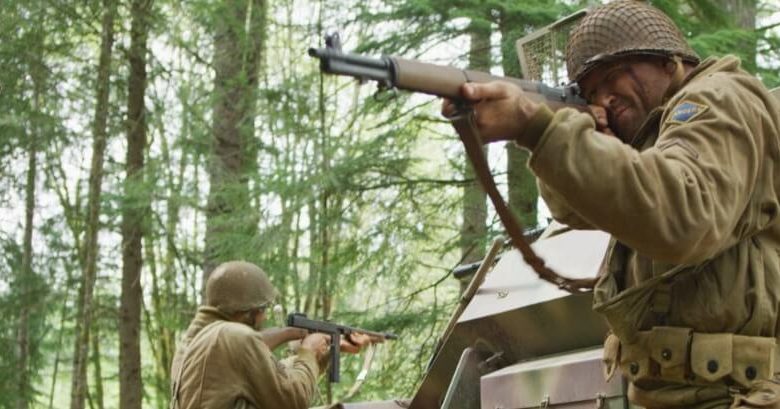
Filmmaker Justin Lee has written and directed four films released this year. None of the four are great, but collectively they show a great deal of potential.
His latest work, “Alone we Fight,” is a WWII drama set within the European theater. The fact-based yarn focuses on two soldiers sent on a do or die mission to take out a refueling station.
Lee has proven he’s a competent director. Given his limited financial resources, it’s no small achievement that he realized four films in such a short span. The problem? Lee isn’t a good writer, or at least not yet.
His last film, “Any Bullet Will Do,” had a great premise and decent plot. Unfortunately, the film focuses too much on characterization through exposition rather than narrative. Lee tells us about his characters rather than showing us who they are.
This is colloquially referred to as “exposition mouth.”
But if “Bullet” was bogged down with exposition “Alone We Fight” is practically drowning in it. The inciting incident doesn’t occur until the 45 minute mark. And up until the mission is introduced the film is one long set of conversations, all about how evil the Nazis are.
It’s not exactly a profound observation.
“Alone We Fight” grapples with larger issues all the same, similar to his approach on “Bullet.” In both films the protagonist is locked in a death battle with racist militarists. I don’t know what Lee’s politics are, so I won’t accuse him of being of the Right or the Left. This perspective could easily be seen as an endorsement of nihilistic tribalism, the very thing that’s crushing America.
RELATED: Decorated Soldier Picks Best, Worst War Movies
To be fair, his protagonists suffer, so its possible he’s showing that path leads to destruction. But that does not seem to be the perspective of his protagonists. There is a sense in which their unfortunate fates are imbued with pagan virtue. The enemies they face are so vile that the hero is required to sacrifice.
The Nazis are called animals. And while National Socialism was certainly animalistic, not every German soldier was a member of the party. Many were fighting for their families. Some were fighting for their country. Nazism dehumanized everything it touched, but so does war. And telling a story where one side are “animals” that need to be put down isn’t exactly a balm for our times.
Lee’s films do not seem to be anti war or anti violence. They imply there’s a glory to it all. Pagan virtue is the best way to describe this ethos. Especially Anglo Saxon or Norse paganism.
Those cultures, like the Spartans before them, viewed death in battle against insurmountable odds as the highest virtue. As Christianity transformed these cultures Jesus took this virtue onto himself. The crucifixion being a clear analogy. The Heliand is an Old Saxon retelling of the Gospels imbued with these warrior virtues. Christianity had an immensely civilizing and enlightening effect on western culture.
If this analysis is correct, this would make the subject matter of “Alone we fight” highly ironic. After all Nazism was obsessed with Germanic paganism. They intentionally sought out a reversion to pre Christian values. Christianity had been tainted by its connection to Judaism. The moral teaching of Jesus focused on the weak and the poor.
In order to establish a millennial reich Hitler thought he needed to purge these civilizing values, returning the Germanic people to a state of nature. In his view we were merely ape against ape. The strongest one could claim all the bananas in the end.
RELATED: ‘Their Finest’ Recalls Unsung WWII Heroes
Needless to say there isn’t much virtue to be found in a worldview like this. And maybe Lee is doing something similar to what Quentin Tarantino did with “Inglourious Basterds.” That film was poo pooed by some as revenge porn or a glorification of violence. But Tarantino made it pretty clear that his movie was a satirical take on dehumanizing violence.
After all he has Hitler and his elite staff trapped within a burning theater watching a propaganda film about a German sniper killing tons of Allied soldiers. The irony wasn’t exactly subtle, but it was clever.
Maybe Lee is parsing out the contradictions created by fighting villains like Hitler. But that seems unlikely given that “Alone” ends with a quote from Ernest Hemingway extolling the virtue of a life lived well.
It must be stressed that Lee’s skills as a director are solid. All the performances are serviceable. The action isn’t exactly impressive, but it’s good enough.
The script is the problem.
Something is missing from Lee’s growing canon. Maybe it’s a lack of maturity. It might be he needs a writing partner. Whatever the case, his best work is still ahead. At the very least it’s good to see a young filmmaker grappling with meaty issues.
So far his reach has exceeded his grasp, but that’s not necessarily bad. It’s part of the creative process.
